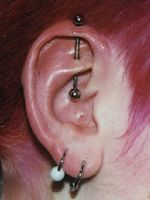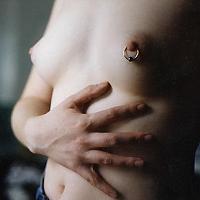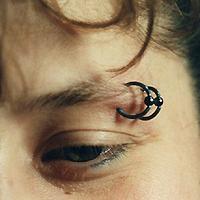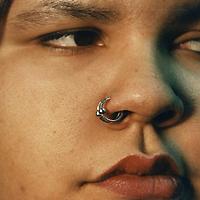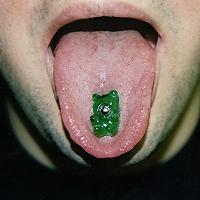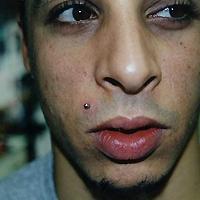

|
Derek Lowe Any of you that have spent any time online in the newsgroup rec.arts.bodyart know piercer Derek Lowe. Any of you that live in Seattle (or Madison) know Derek Lowe. Those of you that don't, be warned. I email him a few simple questions, and he sends back a book! When you're done reading it, you can visit Derek at Body Work Production's website. |
My interest in piercing began fairly late in life compared to many people. I didn't get my first piercing until I was going to college in Milwaukee, WI. My first piercing was a nipple piercing and from that point on, I was hooked. I began finding out as much information about piercing as I could.At that time there was not nearly as much information available on the Internet as there is now, but I absorbed everything I could find. As with many piercers I read all the issues of PFIQ I could get my hands on along with various books (RE:search Modern Primitives being an obvious one) and other materials. At that point, my interest in piercing was simply as an enthusiast. I hadn't given any real thought to doing piercings.
After my first piercing, I accumulated a lot of piercings in a short period of time. Within 9 months of my first piercing, I obtained 7 other piercings. I very quickly recognized piercing as a cathartic experience and a wonderful physical release for emotional and personal stress.
As I received more piercings, my interest grew. I began spending more time at the studio where I was being pierced (Tie Me Down, in Milwaukee, WI), watching anyone's piercing who would let me. I started helping out around the shop with menial tasks. Eventually, I was offered an apprenticeship.
My apprenticeship, while definitely a learning experience, was not what I would consider an ideal apprenticeship. Because of my research up to this point, I came into the apprenticeship with a very good understand of the "theory", but without a lot of hands-on experience. I will forever be grateful to Melissa Strobbe (owner of Tie Me Down) and David O'Connor (the person I did most of my training with) for the opportunity they gave me, but when I look back on my apprenticeship, I still feel as though I learned a great deal from trial and error. To me, that's not the way an apprenticeship should go.
After piercing for about 6 months at Tie Me Down, I graduated college and was a bit unsure what to do with my life. I decided to move to Madison, WI, where my girlfriend at the time lived. I fully intended to find a job utilizing my degree. As chance would have it, I ended up with a part-time piercing position at Steve's Tattoo and Body Piercing in Madison. This eventually led to a full-time position.
This was the period in my career when I feel I grew and learned the most about piercing. As the full-time piercer, I was able to run the piercing portion of the business as I saw fit. I had the freedom to try different things (in terms of technique, jewelry, sterilization etc.) and discover what worked well and what did not work well. I was able to apply the research I had done and began networking with other piercing professionals to improve myself and raise my standards. It was at this point in my career that I became involved with the Association of Professional Piercers and really began to expand my knowledge base.
After being at Steve's Tattoo and Body Piercing for nearly 3 years, I made the decision to move to Cleveland and work at Body Work Productions, Inc. . I had been guest-piercing occasionally at BWP for several years. I have now been at BWP for over a year and feel as though I am the happiest I have been at any point in my piercing career.
|
You say that you love doing intricate ear piercings -- almost every
piercer seems to cite these as their favorites -- why is that?
|
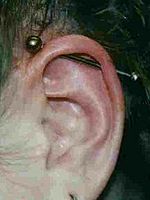
I think there are a number of reasons that I (and other piercers) find these types of piercing so fun and appealing. First of all, intricate ear piercings, especially industrials and orbitals, provide a definite challenge to the piercer. Anytime you are putting one piece of jewelry through multiple piercings, it becomes critical that the piercings are placed perfectly. If the piercings are not dead-on, the pressure put on the piercings makes them very difficult, if not impossible, to heal. Because of the multiple folds and curves present on ears, you end up having to deal with a number of different angles and placement considerations. While accurate placement is important with every piercing, the unforgiving nature of cartilage tissue makes placement even more critical with intricate ear piercings.Along the same lines, the space you have to work with doing these types of piercings is often very limited and cramped. In addition, the folds on each person's ears are different sizes, shapes and sit at different angles. This means that your technique for doing an industrial piercing on one person may not work well when doing an industrial on someone else.
Second of all, for myself anyway, I think intricate ear piercings are some of the most beautiful piercings there are. I think a daith piercing which lays inside an ear perfectly is incredibly striking. To me, one of the things that contributes to the aesthetics of ear piercings is that fact that ears are often taken for granted. Most people don't think of ear piercings as a "big deal", but when someone sees a daith piercing or an industrial, it often catches them by surprise and forces them to re-evaluate their idea of an "ear piercing".
A third factor which makes these so appealing, is that many customers leave exact placement to the piercer's discretion. This allows the piercer to express their "creativity" to some extent and place the piercing so that it flows well with the rest of the ear and any other piercings the person might have. As an example, if someone comes in for an eyebrow or nostril piercing, they usually have some idea of where they want the piercing to go. When it comes to intricate ear piercings, people are often much more open to ideas and suggestions. One of my favorite things is when a person comes and says, "I know I want some sort of strange ear piercing, but I'm not sure what. Do you have any ideas?" This gives me the opportunity to create something from the ground up.
I personally have gotten into doing a lot of less traditional industrials. By this I mean two piercings with a barbell through them, but the barbell may not necessarily be straight. The jewelry might have a severe angle in it or be curved to fit the piercing through two different parts of the ear that you couldn't do with a straight barbell.
I think that some of the most wonderful ear work I've ever seen has been done by my Mike Leatherman who is at Skin of a Different Color in Aurora, IL. The stuff that he does really give you the sense of the "art" that body piercing can be.
|
You also say that you enjoy doing piercings in a ritual setting?
Why is that (and what exactly is that)? What are some of the reasons
people might do that?
|
I think that my choice of the word "ritual" may be a bit misleading for many people. I think the word "ritual" often evokes images of drum circles, fires, chanting and other dogmatic icons. While these things can definitely be wonderful and can be incorporated into a piercing, I don't see them as a necessity for a piercing to have a "ritual" sense to it.When I first started getting pierced, it became a very therapeutic experience. I didn't do it because of extreme emotional distress, teen angst or anything of that nature. But, I found that it did put me in a space mentally and emotionally that was much more soothing and comforting. If I can facilitate such an experience for someone else, I feel as though I am really giving back much of what piercing was, and is, for me. Piercing allowed me to focus on negative things in my life, rid myself of them, and at the same time, embrace the positive things I had going on in my life.
Not everyone is aware, or open, to these aspects of piercings. That isn't necessarily a bad thing. I don't think there are really too many "bad" reasons to get a piercing. Whatever reason(s) someone attaches to their piercing, whether it be purely aesthetics, marking a certain time in their life, reclaiming their body or for sexual enhancement, is totally valid and wonderful. I have known piercers that try to turn every piercing into a deeply spiritual and powerful experience. While that is a wonderful thing for some people, many people simply aren't open to that sort of thing. When you try to force it, you create a situation which is uncomfortable for the client and which may actually result in a bad piercing experience for them.
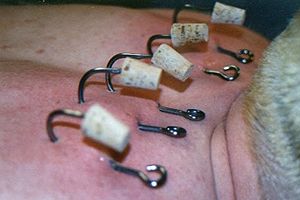
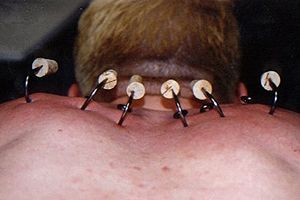
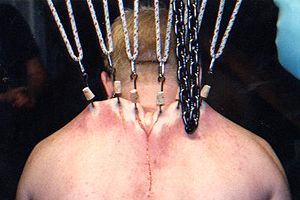
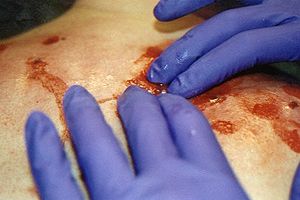
D e r e k ' s S u s p e n s i o n
|
When piercing in a ritual setting, how do you integrate the
medical/safety aspects without disrupting the spiritual nature?
|
As I stated previously, for piercing to be done in a ritual setting it doesn't have to be in the midst of dirt pit with a blazing fire. When it comes to doing piercings in a ritual setting, I think environment is often the key. There are many different things you can do within a piercing room to change or "warm" the environment and still not compromise the health and safety areas. Lighting, music and scent are three things which are usually quite easy to adjust/accommodate without creating any safety hazards. Each of our piercing rooms is equipped with it's own CD player so clients always have the option of bringing their own music when they are getting pierced.If I'm going to do something in a ritual setting I always meet with the person/people involved beforehand to discuss what it is they are looking for out of the experience. This allows me to figure out how to incorporate myself into what they are looking for. For some piercings this will mean being directly involved in the ritual while for others it may mean being as unobtrusive as possible. It also allows me to plan out any extra precautions I might need to take and to let them know what I consider to be okay in terms of health and safety issues.
I also prefer to do ritual-type piercings after hours so that those involved have absolutely as much times as they need to prepare for the piercing as well as take as much time as they need after the piercing. Also, when using incense, sage or other scents, they can be disturbing to some people. Doing it after the shop is closed prevents what is going on with the ritual from interfering with "regular" clients and vice versa.
|
Why is piercing important to humans? Why bother?
|
I think that it is a part of human nature to want to set yourself apart from others in some fashion. In ancient cultures piercings often had a specific meaning or a cultural/societal significance. They served to set certain members of a culture apart from others. I don't think that piercing in today's context has the cultural significance it once did, but it still serves to set people apart to some degree.
|
Tell me about the Health Educators seminar? What does someone get
from attending it?
|
Health Educators, Inc. is a company started by David Vidra, owner of Body Work Productions, to address the very obvious lack of educational resources available to the modification industry. In addition, we provide education to professionals such as health inspectors/sanitarians, nurses, EMT's etc. As piercing becomes more prevalent in our society, the need for educating individuals inside, as well as outside, the modification industry becomes very important. Many states are passing legislation and regulations related to piercing and tattooing. However, the people who end up doing the inspections typically have no training, and at best, only a vague understanding of what they need to be looking for when doing an inspection. Health Educators is trying to provide a resource for training and information for people directly within the industry but also for those that are on the periphery.Health Educators actually offers multiple courses covering various areas: OSHA Bloodborne Pathogens, Cross-Contamination Awareness, Sterilization Practices, Post Piercing and Tattooing Aftercare, Anatomy courses specific to piercing and tattooing as well as an Apprentice Primer Seminar. I'm presuming your question is focused on the Apprentice Primer Seminar.
"When they were putting the human body together,
body piercing was not on the top of the check list."
The seminar itself is taught by Sky Renfro, of Professional Piercing Information Systems, Inc.. Sky is a former instructor for Gauntlet's Piercer Training Seminar. While there are a few other piercing seminars available, I think the course Health Educators offers through Sky is quite unique. Most other piercing seminars will tell you that their seminar is not intended to make you a piercer, yet their course will cover anywhere from 8 -20 different piercings and have you performing those in a few short days after you start the course. The Apprentice Primer seminar focuses primarily on current information relevant to becoming a professional piercers and prepares you to begin an apprenticeship. The focus is on providing students with appropriate information and not on getting them to do as many piercings as possible in a short period of time.In addition, people who attend the seminar get their training in OSHA Bloodborne Pathogens as well as CPR. These are typically issues that, at best, are touched upon only lightly by other seminars. I think that any education someone gets is good, but having had the chance to review most of the courses out there, I think this particular course provides the most solid base of information currently available.
|
Why do you stay so active on rec.arts.bodyart, and maintain a
strong online presence?
|
When I first started researching information about piercing. rec.arts.bodyart was one of the first things that I came across. At the time, there were not nearly as many professional frequenting the newsgroup as there are now. However, it did provide a good source of information, even if not all the information was totally accurate. As piercing grows in popularity, and the general public begins to recognize the need to have their piercings done in an appropriate manner, more people are doing research before getting a piercing. The Internet provides an easily accessible, inexpensive avenue for the exchange of information. By being on-line, it allows me to help others gather information about piercings they are considering. Furthermore, it provides my clients with another way to get in touch with me and ask questions that they may not be comfortable asking over the phone or that they may not think of at a time when the shop is open. In addition, it allows me to stay in touch with other professionals and exchange ideas.I have been accused by a number of people of being obsessed with piercing. I don't necessarily disagree with those statements. Being on-line is another avenue for me to be involved with piercing. In addition, rec.arts.bodyart specifically, has resulted in the creation of some very good friendships. While I may first starting talking with someone because of a mutual interest in piercing, it often goes beyond that. I have attended several RAB "munches" which are a gathering of people who read and/or post to the newsgroup. Many of the people I've met through these gatherings are very interesting and fun people to spend time with.
|
What made you decide to leave Madison, and move to Cleveland?
|
There were three main reason I chose to move to Cleveland. The first reason was the opportunity to work at Body Work Productions. I'd been doing guest-piercing spots at the studio for a few years. The first time I came to BWP, I was blown away. BWP was (and still is) a shop doing exclusively piercing and a shop putting customers' health and safety ,as well as ethics and professionalism, above everything else, including the profit margin. I knew instantly that I wanted to be working in a shop like this at some point in the future. I actually turned down the job offer a few times at different points when I had things going on in my life that made me feel as though it wasn't the right time to leave Madison.
Another reason I decided to take the position at BWP was a feeling of stagnation where I was. After being at Steve's Tattoo and Body Piecing for nearly 3 years, I had made all the improvements that I could make to the operations of the piercing part of the business. Due to either physical constraints of the facilities or an unwillingness of the owner to make further improvements, I had done all I could. In addition, being the only piercer at the studio (besides my apprentice), I had no one to learn from further or to discuss different ideas with. I knew that at BWP I would have the opportunity to learn from other piercers on staff as well as the frequent guest piercers that came to the studio.Lastly, David and I had frequently discussed his plans to move more into piercing-related education. He had recently formed Health Educators, Inc., a company designed to provide the modification community, as well as health sanitarians and other related professions, with health and safety information relevant to our industries. While I love performing piercings, I also enjoy providing others with the information they need to improve the safety and quality of their work. The opportunity to be involved in Health Educators was very appealing.
I consider myself very fortunate to have gotten the chance to work at BWP, as the each time the job was offered to me and I decided not to take it, other piercers were supposed to fill the position. When the offer came around the third time, things in my life had changed a bit and I knew that I would be an idiot if I didn't accept the offer. I spent about a month trying to find reasons not to move, but I was completely unsuccessful at that. So, I accepted the job and I haven't had a single regret about it at this point.
|
I know that you like surface bars, but as I understand it, David
Vidra, and Body Work Productions, does not feel that surface piercing
Is appropriate? What is your feeling on this, and does it ever lead
to conflict? What do you tell clients looking for surface piercings?
|
This brings up one of the many misconceptions about David and Body Work Productions. While we may be a bit more "conservative" than other shops, this doesn't necessarily mean that we are against things such as surface piercing or the use of dermal punches. However, David and myself both feel that surface piercings and the use of dermal punches should be done with discretion.When it comes to surface piercings, the reality is that they often do not heal, even when using surface bars. When surface piercings reject, they tend to leave very noticeable scarring and tissue discoloration. While many customers may not think this is a big deal at the time of the piercing, a year later when they are permanently scarred, they may very well decide they want to hold someone accountable.
I think many times piercer's will perform surface piercings without fully informing their clients of the potential hazards and ramifications. This does a disservice to the client and also leaves the piercer open for legal problems. As much as many piercers like to think that their release/consent form provides them with protection from a lawsuit, this simply isn't the truth. Any client can sue you at any point. If they are able to show negligence on the part of the piercer, in either the act of performing the piercing or that the piercer did not supply them with adequate information, a piercer may very well lose such a lawsuit.
We will do surface piercings at Body Work Productions. In most cases, we will insist on the use of a surface bar for the piercing, as they have been shown to produce the best results. However, before performing any type of surface piercing, we require a consultation with the client to examine the anatomy as well as discuss all of the possible complication that can arise during the healing process. We then typically require at least a one-week waiting period before we will perform the piercing. This gives the client time to thoroughly weigh the pros and cons of the piercing and decide if it is something that is truly right for them.
David and I are currently working with the company who provides our professional liability insurance in piloting a program for insuring surface piercings. Even at this, there are some surface piercings which we will not perform, as they exceed what we consider to be our comfort level in terms of safety.
|
What should people, especially younger people, think about before
they get a piercing?
|
Obviously, the health and safety aspects are very important and are often overlooked by people when it comes to getting pierced. This definitely seems to be more of an issue with younger people. Youthful exuberance and the desire to get pierced often overshadow doing any type of research or rational thought. There is rarely a day that goes by when I don't have at least one customer who says something along the lines of, "I know I shouldn' t have gotten pierced there. The place didn't look very clean." But, human desire is often stronger than logic and rationale. The reality of it is that it doesn't matter how nice your piercing looks or how much like it if you get a case of Hepatitis to go along with it.
The fact that piercing is a permanent change to the body is another aspect which is often overlooked. While the jewelry may not be permanent, the actual piercing itself does result in permanent changes. I would say most people do not take into consideration that permanent scarring, while perhaps not excessively noticeable, usually occurs. Also, people often neglect to consider that infections can occur and that some piercings just don't work out for everyone. They presume because they know other people who have a certain piercing, and those people's piercings healed fine, that their piercing will also heal without a problem. With appropriate care of the piercing, this is usually the case. However, there are no guarantees that every piercing will be problem-free.I think that oral piercings, especially tongue piercings, is an area that people often don't understand the potential for permanent damage. While I think BME is a great source of information for people, there was a piece several months ago entitled "The Right Way To Pierce". While I think this piece made some good points in saying that there isn't one "right" way to do a piercing, the section entitled "Any Tongue Can Be Pierced" was a bit misleading. While it's true that any tongue CAN be pierced, whether or not it is a good idea to pierce it is another issue entirely.
When the anatomy of the tongue, as well as the rest of the mouth, is not taken into consideration when determining the placement of a tongue piercing, the potential for damage to teeth and gums becomes very real. I personally don't feel that placing tongue piercings at a front-to-back angle (further back on top than on the bottom) is a very good idea. When tongue piercings are placed in this manner, the jewelry ends up resting at a severe angle when the tongue is in the mouth. This angle can put pressure on the piercing causing tearing. It can also put the bottom ball of the jewelry very close to, or against, the gums and teeth. The friction that results can often cause bone erosion and/or gum loss. It has only been in the last few years, as tongue piercing has become more popular, that we are beginning to see the potential damage that can occur. Some people still choose to ignore this and they pierce every tongue that walks into their studio. I think this is incredibly poor ethics and professionalism.
One thing I often tell my clients to get them to understand why their anatomy isn't appropriate, and say, they have a friend with the same piercing, is this: "When they were putting the human body together, body piercing was not on the top of the check list. Some people have anatomy that makes it safe to do a certain piercing, some people don't." A piercing is a foreign object in the body. When you start to work too far outside of the parameters of the anatomy, that is when you start to encounter problems and permanent damage.
|
How would you like to see piercings presented in the media?
|
I think the obvious answer to this is having piercings, and pierced people, portrayed in a positive fashion. I don't know that we will ever reach this level, but it is something to hope for and something to try and promote. I know many pierced people are easily frustrated by the news media's portrayal of our community. Unfortunately, a "shocking" portrayal is what gets viewer ratings and viewer ratings translate into money. It's also important to realize that the media is unable to sensationalize things if you don't give them anything to work with. I've been told upon several occasions that my interviews were not used, or were used very little because I just didn't have the "flare" they were looking for or I was kind of "boring." If you present yourself in an intelligent, informed and articulate manner, the media won't be able to portray you any other way. Over the years I've come to not expect responsible, accurate representation of the pierced community by the media. If you approach it with that outlook, you are likely not going to be disappointed and when you encounter a media person who does a good job of representing pierced people, you will be pleasantly surprised.
|
What are some of the myths that non-pierced people need dispelled about
piercings?
|
I think one of the biggest myths is that pierced people represent a very specific, very limited cross-section of our society. Anyone who is involved in the modification community knows that the clients come from all professions, religions, backgrounds and that they completely cover the age spectrum. If non-pierced people had any idea how many people they come across in their daily lives who are pierced, they would probably be quite surprised.Another thing which I think should be addressed, although it may not be a myth per se, is that people who are pierced don't mind being poked, prodded, touched or otherwise fondled , simply because they are pierced. I'm always more than glad to let someone who has genuine curiosity about my piercings take a look at them (the visible ones anyway). However, the moment they try to touch my piercings, I become a little less friendly and open. Most non-pierced people would be highly offended and uncomfortable if someone came up to them and started touching their ears of reaching for their face. However, they often don't think twice about doing the same thing to pierced people.
There is, of course, the common misconception that pierced people are usually unintelligent, criminals, "rebels" or fall into some other category of "undesirable" types. While this is an incredible generalization and something that is very far from the truth, I think pierced people need to realize that they have an element of responsibility in changing this perception. I'm just as sick of answering the "Does it hurt?" question as every other pierced person is. However, if someone approaches me with genuine interest and wants to ask me questions, I try to answer them in a polite, informative manner. While pierced people may not get visible piercings for the purpose of attracting attention, we must also realize that it does exactly that. And as such, we have to be prepared to deal with people asking questions, staring or otherwise being somewhat invasive. If you react in a hostile manner to those that approach you, the only thing that is accomplished is the proliferation of many of the stereotypes that already exist.
|
Do you think piercing will become extremely mainstream (like haircuts),
|
I'm not sure we will ever see piercing being as commonplace as haircuts. However, I think it is readily evident that piercing is more than a mere fad. It is something that humans have been doing for thousands of years. The need/desire for adornment has been reawakened in our society. While the motivation within current society may be different from that of primitive cultures, the desire is still there.I think piercing has established itself as something that is here to stay. Piercing, even though it has only been around in a "popular" sense for a short period of time, has had impacted our society on sociological, economical and political levels. On a sociological level, the interaction of pierced people and non-pierced people represents a new dynamic. Piercing often results in interaction between people, in different parts of society, that might not otherwise occur. When non-pierced people start asking questions about modifications, it opens lines of communication that would likely never be explored otherwise. We are also beginning to see places where modified people can be employed and piercing is accepted, or at least tolerated. There are some stores/companies, such as Hot Topic and The Hard Rock Caf�, where piercing and other modifications are actually preferred.
I think the economical impact of piercing is fairly obvious, but not one many people rarely consider. Aside from the obvious creation of an entire new job market just for piercers themselves, the increase in the consumption of goods and services related to piercing is something you also have to consider. Look at the number of people who are involved in the manufacturing of body jewelry. I would be very interested to see numbers on the increase, over the last 5 years, in the amount of implant-grade stainless steel produced and purchased. While stainless steel is used in many different areas, that particular grade of steel has limited applications. Many jewelry companies sell their captive bead rings with hematite balls. There is another area where the demand for a material has increased and had an economical impact. The medical supply industry has also certainly had to have seen an increase in it's goods sold.. As more modification artists become aware of the appropriate steps needed to monitor the sterilization process, laboratories that offer spore testing are seeing an increase in their business. The use of Statim autoclaves, while still somewhat controversial in the modification community, is increases. Our community represents another potential market for a product that I'm sure the designers never considered.
The increase in the popularity of body piercing and tattooing is beginning to impact the political structure of our society as well. As the awareness of the potential public health risks involved in modification increases, the need for legislation and regulations becomes more apparent. While most professionals I know would like to see responsible regulations and legislation, many often don't realize that there is a great deal of politics that go into accomplishing this. In any regulatory process I've been involved in (mainly in Wisconsin), you have to be able to play the political game to some extent. You have to be willing to make some sacrifices in order to get regulations into place. Once they are in place, then you have to go through the political process to get them amended for improvements. Legislation and regulations may sometimes be introduced by a political figure (as opposed to a push by professionals), but I'm a firm believer that the involvement of well-informed, responsible piercers is the only way to ensure that well-written regulations are enacted.
|
Do you think piercing will eventually fade away,?
|
I do feel that we will see a slight tapering off in the number of people getting pierced. I think the primary impact this will have is on the "hacks" and those that are doing piercing simply to make a quick buck. As the quick money starts to dwindle, those that don't have a true love for the art form will slip away. This will leave only those truly dedicated to the art of piercing. With the money-hungry piercers gone from the scene, it will leave enough business to sustain those that are left. Of course, I could be completely wrong and it could simply be wishful thinking since my livelihood depends upon people continuing to get pierced.
|
Or do you think piercing might stabilize
as a significant yet subcultural activity?
|
I would like to see piercing become a little less of a subculture. I believe we will see more professional industries open up to the idea of visibly pierced employees. At some point, hopefully people will realize that someone's appearance does not impact their ability to do their job appropriately. I'm sure that some of the traditionally staunchly conservative professions will always maintain a hard line where piercing is concerned. However, I believe some areas of professional society will become more accepting.
|
What are your non-piercing interests? What do you do outside of this?
|
At the moment, I don't really have a lot of hobbies or anything of that nature. I'm not a real big believer in "New Year's Resolutions", but I do have a goal this year to start being involved in more things that are not piercing related.I have recently started getting into making some electronic-type music with my computer. At this point, it is still very experimental for me and I wouldn't consider the music I've made all that good. But, it is a creative outlet that I'm beginning to enjoy more and more.
I enjoy listening to music quite a lot, especially ambient electronic stuff. Perhaps, as my skills increase in making music, I'll be able to create some stuff that is specifically designed/oriented for getting pierced. For me personally, and I think for many people, music plays a big part in their lives and can be very helpful in getting them through the anxiety of getting a piercing.
|
What fact about you would most surprise your customers?
|
I think the thing that might be most surprising is the fact that I have a Bachelor of Science in Electrical Engineering. While I know many piercers who are highly educated, most people don't expect piercers and other body modification artists to be well educated.When I do tell people about my educational background, they often have a hard time understanding how I could be doing piercing when I could be doing engineering and potentially be making a lot more money. My typical response is to point out that most people don't like the jobs they have, whereas I'm fortunate enough to have a job that I enjoy and like to go to each day. That usually gets the point across pretty well.
|
Tell me about your role in the APP? While the APP has an obvious value
both to studios and the community as a whole, why has it been so
difficult to build up members? In addition, why has there been so
much internal political upheaval?
|
My current role in the APP is fairly limited. I am a trustee of the organization and at one time was on the Board of Directors. I resigned from my position on the Board due to not having the time to dedicate to completing my duties. I joined the Board to help the APP grow and become better organized and run more smoothly. When it became evident that my other demands were interfering with the job I needed to be doing for the APP, I decided it was time to resign. I would have been more of a detriment to the organization than a benefit at that point. I am currently still active with the organization and try to stay on top of developments within the APP. I try to help out the Board and provide advice whenever possible. I think the current APP Board is one of the strongest the organization has ever had and has made great forward movement in the development of the organization.I think the problem generating membership stems from a couple of different areas. The APP was started by Michaela Grey, who, at the time, worked for Gauntlet, Inc. . For whatever reason, many piercers used to (and some still do), viewed Gauntlet as some sort of "evil empire." So initially there was a lot of resistance in joining the APP because people felt that Gauntlet controlled the APP or it was bad to be associated with Gauntlet. I think a lot of piercers also felt the APP was going to try and be the "piercing police" or try to dictate piercing technique. I think this concern over "being told what to do" is still prevalent in the industry to some extent and that many piercers decide not to join the APP because of this misconception.
Another major factor, and one that is just now starting to become fully-resolved, was the internal structure of the APP. The APP was started as a project of Michaela Grey's. The need for the organization was recognized quickly within the industry and the APP began to expand rapidly. The work that needed to be done was often left to one or two people, making it difficult for the APP to adjust appropriately to the growing needs of its members. This resulted in problems with staying on top of processing applications as well as addressing other issues (such as legislation) which fell within the scope of the organization. The amount of work, and the lack of people willing to do the work, resulted in a bit of a bottleneck. It took several different configurations of the Board of Directors to work out all the trouble-spots so that things would run more smoothly. The current Board of Directors has made great headway, building on the hard work of all the previous Boards, in expanding membership.
I know that Michaela Grey is not always well-liked within the piercing industry. However, I do think she deserves a great amount respect and appreciation for the work she did in forming the APP as well as running it nearly single-handedly for a number of years. I feel the APP is the primary reason that the piercing industry has opened up to the extent that it has and the reason there is a great deal of communication amongst piercing professionals throughout the world.As for political upheaval, I think in part it is simply due to human nature. Anytime you have a group of 3 or more people, there will always be hidden-agendas or politics that arise. I don't know of anyway around that fact. In addition, whether there is "upheaval" or not depends a lot on your perspective. When you are not on the Board (which is completely voluntary) and do not have to sacrifice your personal time, and in the beginning personal financial expense, it is very easy find fault with how things are run. Add to this the egos that pervade the industry and the often-present "my way is right, yours isn't" attitude that is found, you are going to have conflict and disagreement. My experience has been that those who make the most noise and have the loudest voices of complaint are usually the ones who become the quietest or the hardest to get a hold of when you wish to ask them for some help.
Return to BME/People
